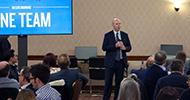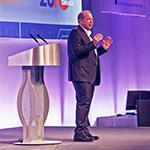March saw the Optix Conference return to the luxurious surroundings of the Celtic Manor resort in Newport, Wales, for a third consecutive year. The event has grown since its inception 11 years ago as a relatively small user group meeting for the practice management software provider to a major event on the optical calendar boasting big name speakers and many top optical companies exhibiting as sponsors.
With 380 delegates at the event and costs amounting to more than £1,000 per attendee, Optix managing director Trevor Rowley explained that the sponsor companies play an essential role in allowing for the prestigious speakers that the conference has become renowned for.
‘We started back in 2008 with no sponsors at all and didn’t have any external support until the third meeting at Oulton Hall 2010 when Birmingham Optical attended,’ said Rowley. ‘The following year we added Rodenstock, which is where we stayed until 2012 when we had four sponsors at Carden Park, six sponsors at Slaley Hall in 2013, and then 17 at Chesford Grange in 2014 and 2015. Moving to Celtic Manor in 2016 allowed us to increase this to 23 for the last two years and then this year we have increased to 36 by moving into the exhibition hall. In truth we could sell the space twice over but it’s very important to me that we remain a conference with a supporting exhibition and not the other way around.’
Certainly the buzz around Celtic Manor mostly related to speakers with long standing attendees reminiscing about their favourites from previous years and looking forward to the 2018 crop.

The conference ran March 19-21 and, on the opening day, those lucky enough to get a place were treated to a teamwork workshop run by the returning Sir Clive Woodward (pictured), who did the keynote address last year on individual performance.
There are few people better placed to discuss elite performance and teamwork than Woodward. A former international rugby player, he is best known for the eight years spent as head coach of the England rugby team which culminated with winning the World Cup in 2003. This was followed by one year in football and he then served as director of performance for the Team GB through three Olympic Games including London 2012. Woodward also boasts extensive experience in business, both before his various managerial sporting roles as a sales director and since with various consultancies.
To start Woodward raised a laugh, particularly from the numerous non-English members of the audience, by remarking that he would not be talking about rugby after the final round of the Six Nations saw Ireland complete a Grand Slam by defeating England in London. In defiance of this jocular remark, the workshop centred on examples culled from his extensive experience in sport.
‘People love leading and being part of high performing teams,’ said Woodward. ‘When putting together a team in sport or business, you can’t spend too much time, effort and money on recruiting the right people. But getting the right people in place is just a starting point, talent alone is not enough. Managing it in the right way is crucial.’
Woodward divided this challenge into three parts: leadership, teamship and partnership.
‘Leadership is about vision, culture, standards and identity. I’ve never seen any business or sports team go well without it, but the importance of leadership is well known, in fact Harvard Business School has noted there are roughly 3,500 books on leadership released each year.’
Conversely Woodward feels teamship is a less heralded but no less important concept.
‘Teamship was hugely important to the 2003 England Rugby team. A set of teamship rules was generated with each one needing 100% agreement by all team members. Time keeping is very important and I posed the question to the team – what is the elite approach to time keeping? The players came back with the following definition: “Absolute punctuality is essential. Elite time is 10 minutes early and ready to start.” That is what they adopted and no one was ever late.’
Moving on to his time with the Great Britain Olympic team, Woodward noted that delivering success at the London 2012 Olympic Games involved bringing together many different organisations.
‘The focus was all on London 2012 to ensure we delivered and that meant bringing 26 different businesses [the individual sports associations like British Cycling and British Swimming] together in partnership to create Team GB. We competed across 26 sports with 542 athletes, 450 coaches and 300 volunteers.’
Woodward’s tenure began before the Beijing Games in 2008 and, despite a strong medal showing, he was dismayed by athletes trashing their rooms and not wearing official apparel.
‘Behind the scenes it was chaotic. Immediately after the games I got all 26 stakeholders together, highlighted the need to improve and how to do so. We adopted a one team strategy with five team values to match the five Olympic rings. We created teamship rules for health and other things like mobile phone use. By London 2012 we were in position to do detailed things like setting up a sterilisation unit for the athletes’ bottles. We won 29 gold medals and I think it shows that teamship can work in small teams and across huge teams.’
Woodward then described some of his experiences applying his techniques in business. Effective strategies included banning mobile phone use during meetings and vastly reducing email usage.
‘Everything is geared up for people working better and improving the bottom line – whatever that is. It is essential that rules come from the team itself rather than just imposed from above.’
The second half of the session saw Woodward lead the group through a series of exercises designed to challenge and assess people’s attributes in terms of leadership, partnership and teamship. The various practice managers and owner present were challenged to confront what their teams would say about their leadership and give examples of strategies that worked well or failed. Many people found that teams worked best during busy, pressured periods that required a high level of engagement.
Ultimately a quantitative questionnaire was filled out by each participant with scores then transposed into a graph showing strengths and weaknesses across leadership, partnership and teamship.
‘Of the three, I would make a particular effort to address teamship because working on that naturally helps improve leadership and partnership.’

The second day of the conference began with a Star Wars style opening the highlight of an impressive audiovisual production. Rowley (pictured) then took to the stage to welcome the 380 delegates and deliver an update on Optix software. Most significantly he announced that a new version will be launched in May of this year to ensure compliancy with General Data Protection Regulation (GDPR) alongside a revamped eye exam area, audiology component and an app version of the system.
Over the rest of the conference attendees were treated to speeches by former Royal Marine Wayne Hoyle, businesswoman Karren Brady, entrepreneur Sarah Willingham and a keynote delivered by astronaut Chris Hadfield.

Karren Brady, Wayne Hoyle and Sarah Willingham
During the gala dinner on the Tuesday night, delegates donated £7,480 to the chosen charity Henshaws, which supports people living with sight loss. This amount was matched by Optix and, together with Gift Aid, made for a grand total of £16,830.
The conference closed with a video message from Sir Bob Geldof announcing he will be the keynote speaker at next year’s event, which will be held at Celtic Manor March 25-27, 2019.
